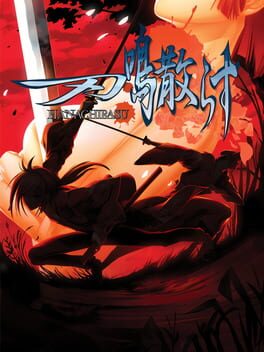"I crawl like a worm over bleached white bones,
blood my sustenance, and hate my reward.
Yet still, the sword, it rules me."
As I've mentioned before, I absolutely love artists' works that show tremendous passion and research done into the topic of focus. For example, Ridge Racer Type 4 and its clear love of the race, the cars, the experience of driving. One of my favorite manga, BECK, spoke to me as someone with a background in playing and recording music. Hanachirasu is such a work, and given the praise for the combat scenes in Ittetsu Narahara's work I'd heard so regularly, it came as no surprise that the swordplay and divulging of evident love of the blade and the historic roots of its arts was one of its strongest facets.
I found much of Narahara's discussion of the matter genuinely interesting, taking time to allow myself to truly immerse in the art of the sword - I actually searched up some YouTube videos depicting some techniques and traditions mentioned. In turn I feel like this passion speaks to the author's love of his homeland, of the traditions of the Japanese people that were so clearly left to die out by the terrors its people suffered at the hands of the West, predominantly during and post-World War II. Not to get too political, but I've seen the critique of Narahara's work as being somehow right-wing propaganda. As a staunch leftist, I question if this read comes from a place entirely based on Western values, politics and traditions - the patriotism and reverence of Japanese culture on display doesn't speak to dogmatic conservationism, but reclamation of a culture and history on the threshold of extinction at the hands of the West, predominantly America, and its treatment of the Japanese.
Ultimately, though, all of this serves as a backdrop and contextualization for a story about revenge and obsession; the lengths insecure and emotionally damaged people may go to in order to make it "right" by themselves, whittling the existence of themselves and others down to purely the goal at hand. Anything in the way of that or left over afterwards, like dust, like petals on the wind. One might read Akane as a character entirely fueled on the prospect of simply not being good enough, forgoing growth and acceptance and seeking the carnal and instinctive route to block out the pain until it simply stops or becomes too much. It's a story that doesn't seek to blow minds or twist your perceptions of its reality - some minor twists aside it remains entirely grounded in its concept and execution - but rather, like tate-do theatrics, shine a line on two intertwined souls not simply bound by the bound, but the dedication to become twin blades themselves.
—— A story leading to only one possible conclusion.
The curtains close on as quiet and contemplative a scene as the game has. Simply poetic.
blood my sustenance, and hate my reward.
Yet still, the sword, it rules me."
As I've mentioned before, I absolutely love artists' works that show tremendous passion and research done into the topic of focus. For example, Ridge Racer Type 4 and its clear love of the race, the cars, the experience of driving. One of my favorite manga, BECK, spoke to me as someone with a background in playing and recording music. Hanachirasu is such a work, and given the praise for the combat scenes in Ittetsu Narahara's work I'd heard so regularly, it came as no surprise that the swordplay and divulging of evident love of the blade and the historic roots of its arts was one of its strongest facets.
I found much of Narahara's discussion of the matter genuinely interesting, taking time to allow myself to truly immerse in the art of the sword - I actually searched up some YouTube videos depicting some techniques and traditions mentioned. In turn I feel like this passion speaks to the author's love of his homeland, of the traditions of the Japanese people that were so clearly left to die out by the terrors its people suffered at the hands of the West, predominantly during and post-World War II. Not to get too political, but I've seen the critique of Narahara's work as being somehow right-wing propaganda. As a staunch leftist, I question if this read comes from a place entirely based on Western values, politics and traditions - the patriotism and reverence of Japanese culture on display doesn't speak to dogmatic conservationism, but reclamation of a culture and history on the threshold of extinction at the hands of the West, predominantly America, and its treatment of the Japanese.
Ultimately, though, all of this serves as a backdrop and contextualization for a story about revenge and obsession; the lengths insecure and emotionally damaged people may go to in order to make it "right" by themselves, whittling the existence of themselves and others down to purely the goal at hand. Anything in the way of that or left over afterwards, like dust, like petals on the wind. One might read Akane as a character entirely fueled on the prospect of simply not being good enough, forgoing growth and acceptance and seeking the carnal and instinctive route to block out the pain until it simply stops or becomes too much. It's a story that doesn't seek to blow minds or twist your perceptions of its reality - some minor twists aside it remains entirely grounded in its concept and execution - but rather, like tate-do theatrics, shine a line on two intertwined souls not simply bound by the bound, but the dedication to become twin blades themselves.
—— A story leading to only one possible conclusion.
The curtains close on as quiet and contemplative a scene as the game has. Simply poetic.

mpy
8 months ago